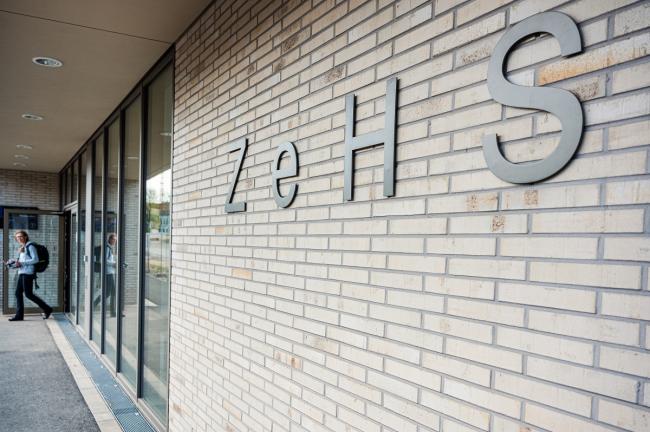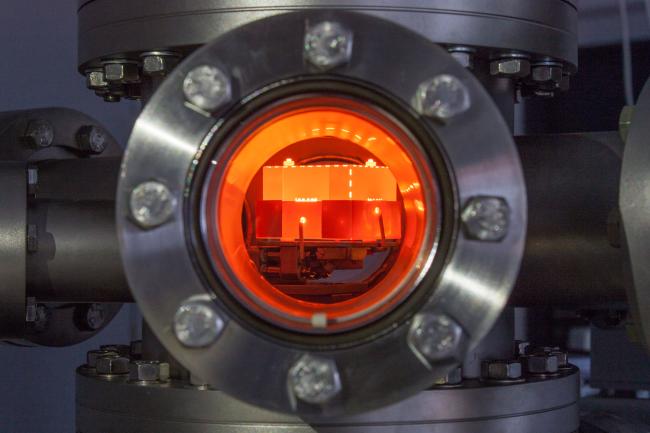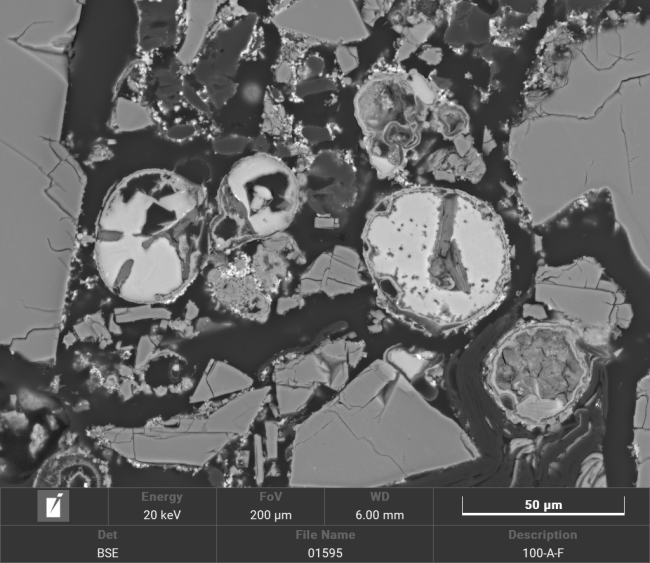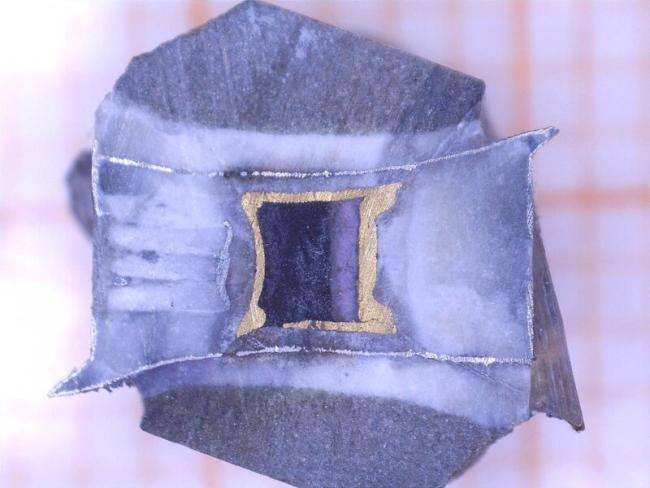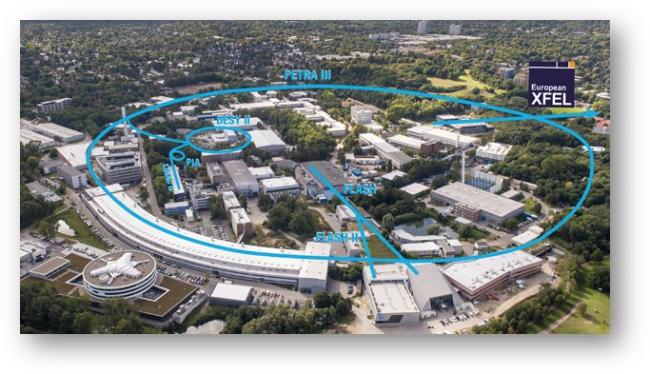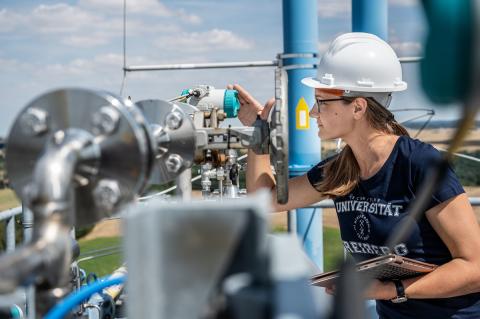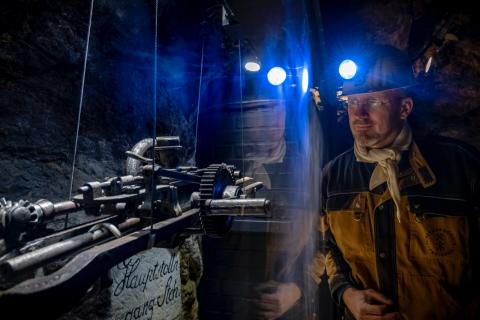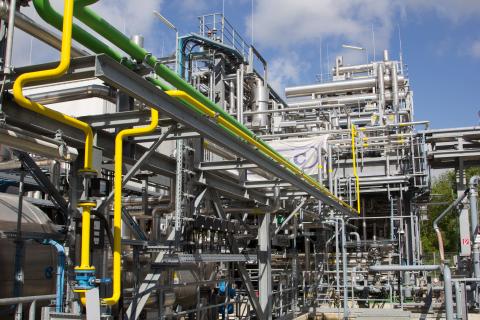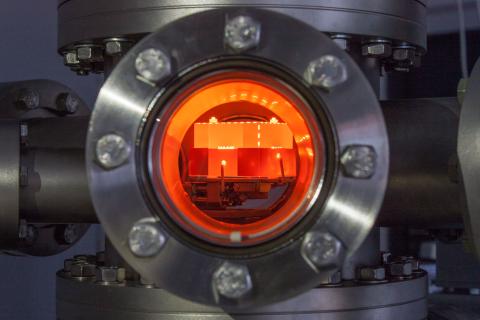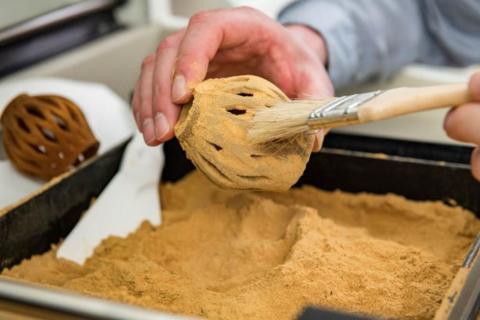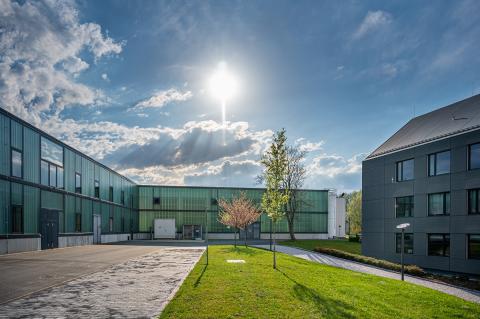Research for the sustainable use of resources
Resources form the basis for the economy, prosperity, security and innovation. This makes it all the more important to use them responsibly and sustainably. At TU Bergakademie Freiberg, technologies and solutions are developed to overcome key societal challenges in relation to the sustainable use of resources. Its profile combines the interlinked profile fields of GEO, MATERIAL, ENERGY and ENVIRONMENT in research and teaching and is consistently geared towards the requirements of the future.
Humanitarian responsibility, environmental and climate protection, efficient use of scarce raw materials and sustainable provision of energy are key motivators of our research. Many of the innovations resulting from our research contribute worldwide to the goal of closing the energy and material cycles.
Research areas of the faculties
Scientific, interdisciplinary centres (selection):
Excellent research infrastructures
A particular strength of TU Bergakademie Freiberg is its excellent, in some cases unique, equipment and research infrastructure, which enables end-to-end technology developments based on basic research, modelling and simulation through to technology development on an industrial pilot scale.
In addition to well-equipped laboratories and pilot plants in the fields of chemistry, physics, environmental and geosciences, geotechnics, metallurgy, glass and ceramics, process engineering, additive manufacturing, materials technology, robotics, foundry and forming technology, semiconductor and sensor technology as well as heat and energy technology, several central infrastructure facilities are available to researchers.
Central infrastructure facilities
Partnerships, Networks and Alliances
The TU Bergakademie Freiberg is a leading institutions in the field of resource technologies. With a well-established network of universities, research institutes and industry partners, the TU Bergakademie Freiberg drives forward innovative solutions for the sustainable use and efficient processing of resources. In an increasingly interconnected and complex world, the university relies on regional was well as international alliances and networks to jointly address forward-looking research questions and promote the transfer of knowledge across national borders.
International and national co-operations and networks
The TU Bergakademie Freiberg is one of the top international addresses in the field of research into resource technologies and has been shaping developments in this field worldwide since its foundation. A large number of research institutions in the field of resource research can trace their origins directly back to TU Bergakademie Freiberg or scientists trained here. The network that has grown and the number of partnerships are correspondingly large. In addition to numerous national and international university, research and industry partnerships, TU Bergakademie Freiberg is actively involved in networks such as the European University Alliance EURECA-PRO - The European University on Responsible Consumption and Production and the German Resource Research Institute (GERRI). She was also the driving force behind the founding and development of the world's largest innovation network for resource technologies, EIT RawMaterials, with more than 120 partners from education, research and industry.
Freiberg as a centre of science
Numerous scientific institutions and research-related organisations and companies are located in Freiberg and the surrounding region. Partners at the site include the Helmholtz Institute Freiberg for Resource Technologies HIF, the Fraunhofer Technology Centre for High Performance Materials, the Fraunhofer Outstation for Carbon Cycle Technologies, the DBI - Gastechnologisches Institut gGmbH, the FILK Freiberg Institute, the Landesamt für Landwirtschaft, Umwelt und Geologie, the Sächsische Oberbergamt and several other affiliated institutes and industrial research organisations.
Regional networks and initiatives
Saxon initiatives in which the TU Bergakademie Freiberg is actively involved include the 4transfer Innovationsverbund, Energy Saxony, Leichtbau-Allianz Sachsen, sächsische Wasserstoff-Union, rECOmine, GlasCampus Torgau, Geocompetence Centre Freiberg, Freiberger Interessengemeinschaft der Recycling- und Entsorgungsunternehmen and Circular Saxony.
Cooperation with foundations
Several foundations are important sponsors of science and research. The Dr Erich Krüger Foundation, one of the largest university foundations in Germany, should be emphasised here, with the help of which projects worth well over 1 million euros can be implemented each year.
Research at the TU Bergakademie Freiberg
The university offers excellent working and environmental conditions for national and international researchers as well as the next generation of scientists. Collaboration within the university is characterised by short distances and direct communication between the academic departments, administration and university management in a collegial, innovation-friendly and supportive atmosphere. This enables individual and flexible solutions as well as the rapid and pragmatic realisation of ideas. Modern and generously equipped laboratories and pilot plants, access to an excellent infrastructure and access to renowned partner institutions worldwide enable the realisation of ambitious scientific projects and create a motivating environment.
Promoters, postdocs and visiting researchers are supported by a comprehensive range of support and services and encouraged in the implementation of their projects as well as in their individual qualification and personal development. In addition to peer networks, mentoring and coaching programmes, the Graduate and Research Academy GraFA and the International University Centre "Alexander von Humboldt" IUZ offer a wide range of further education and service programmes.
Freiberg offers a pleasant and family-friendly living environment for scientists, with attractive housing, leisure and cultural activities, modern and lovingly equipped daycare centres and schools as well as medical care facilities.
Responsible research - ethical and quality standards
Social responsibility
Our research is at the service of society. With our work and its results, we contribute to creating and maintaining good humanitarian and natural living conditions and to solving the major social challenges of resource, environmental and climate protection. We promote sustainable development in line with the United Nations Sustainable Development Goals (SDGs) as well as innovation-friendly, cosmopolitan, peaceful and tolerant coexistence.
Good scientific practice
The TU Bergakademie Freiberg is committed to the principles of good scientific practice and the requirements of the DFG Code of Conduct "Guidelines for Safeguarding Good Scientific Practice" and implements these in a binding manner for all researchers and students. Good scientific practice concerns scientific work and documentation, interaction and communication with students and staff and the publication of results. The corresponding regulations offer support and guidance. It also regulates the handling of conflicts. To ensure good scientific practice, an ombudsperson has been appointed at TUBAF and a commission has been set up to deal with allegations of scientific misconduct.
Freedom of research, respect and diversity
The TU Bergakademie Freiberg grants scientists a high degree of freedom. It encourages courage, creativity, entrepreneurship and a spirit of discovery. It strives for a culture of facilitation and support, curiosity and respectful interaction. This includes openness to new and unconventional approaches and methods. Researchers are treated with equal respect, included in the community and individually supported regardless of gender, ethnic and cultural origin, religion, world view, individual limitations or orientations.
Transparency and Open Science
The TU Bergakademie Freiberg is committed to Open Science and supports the disclosure and dissemination of knowledge and research results for the benefit of humanity and the realisation of the goals of sustainable development. It is a signatory to the Berlin Declaration on Open Access to Knowledge in the Sciences and Humanities and provides its scientists with the necessary means to publish research results and data openly accessible. With the publication platform Qucosa and the research data repository OpARA, the university has its own repositories. In addition, TU Bergakademie Freiberg is part of the DEAL consortium and offers support for fee-based open access publications with an open access fund.
The university promotes science communication and the transfer of knowledge and technology to industry and society with various formats of its own, for example as part of the 4transfer project.
Research data management
The TU Bergakademie Freiberg creates the necessary conditions for the professional and responsible handling, long-term preservation and accessibility of research data. We are a member of the National Research Data Infrastructure e.V. (NFDI) and our scientists are actively involved in the relevant specialist groups. We are also involved in the Saxon network SaxFDM (Research Data Management Saxony), which provides advice and support to Saxon researchers.
Digitisation strategy for research and transfer
Information page on research data management at TUBAF
Safety-related research, ethics and compliance
The TU Bergakademie Freiberg is committed to compliance with national and international legal and safety standards, to scientific integrity and to the ethically responsible implementation and utilisation of the results of research projects. The recommendations for dealing with security-relevant research published by the DFG together with the Leopoldina are comprehensively implemented at TU Bergakademie Freiberg. If necessary, researchers at the university can seek advice from the Vice-Rectorate for Research and the Rectorate Commission for Research, which operates as a "Commission for Ethics and Safety-Related Research". The commission can also issue ethics votes required for certain project funding.
A working aid for self-assessment of the safety relevance of research activities is available in the form of a handout with key questions and further information: Guiding questions for self-assessment of the safety relevance of research (PDF).
The Faculty of Business, Economics and Informatics has set up its own ethics committee for research in the social and behavioural sciences and research involving human subjects. Information on this can be found at https://tu-freiberg.de/fakultaet6/forschung-der-fakultaet-fuer-wirtschaftswissenschaften/forschungsethik.
Ethical and safety-related risks also exist in connection with scientific collaborations, especially those with international partners. TU Bergakademie Freiberg is clearly committed to the applicable regulations of foreign trade and export control law. These regulations are intended to prevent the proliferation of weapons of mass destruction and the uncontrolled transfer of conventional armaments and to ensure protection against serious human rights violations and terrorism. Any scientific or economic activity with a foreign connection, even if it only involves the transfer of knowledge or measurement results, must be independently checked for relevance under foreign trade law. In cases of doubt, the contact persons in Department 2, Division Research Affairs or the Legal Department will advise you and, if necessary, provide information on how to proceed and on notification or authorisation requirements.
Risks also arise in connection with espionage in science and research and active attempts to circumvent sanctions. Scientific institutions and researchers are direct targets for foreign intelligence services, but also for organised crime. Researchers face particular security risks when travelling abroad. The Federal Office for the Protection of the Constitution (Bundesamt für Verfassungsschutz) has provided information and recommendations on this subject:

